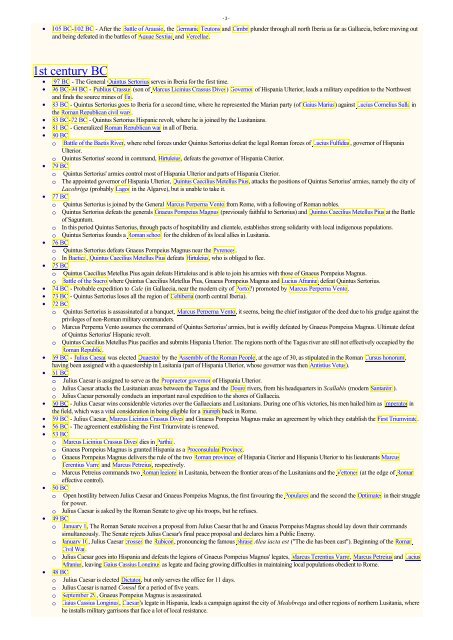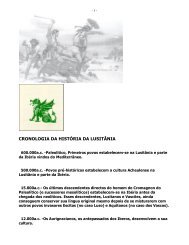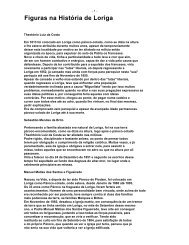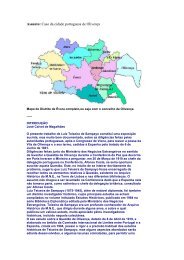Timeline of Portuguese history (Lusitania and Gallaecia)
Timeline of Portuguese history (Lusitania and Gallaecia)
Timeline of Portuguese history (Lusitania and Gallaecia)
Create successful ePaper yourself
Turn your PDF publications into a flip-book with our unique Google optimized e-Paper software.
- 3 -<br />
• 105 BC-102 BC - After the Battle <strong>of</strong> Arausio, the Germanic Teutons <strong>and</strong> Cimbri plunder through all north Iberia as far as <strong>Gallaecia</strong>, before moving out<br />
<strong>and</strong> being defeated in the battles <strong>of</strong> Aquae Sextiae <strong>and</strong> Vercellae.<br />
1st century BC<br />
• 97 BC - The General Quintus Sertorius serves in Iberia for the first time.<br />
• 96 BC-94 BC - Publius Crassus (son <strong>of</strong> Marcus Licinius Crassus Dives) Governor <strong>of</strong> Hispania Ulterior, leads a military expedition to the Northwest<br />
<strong>and</strong> finds the source mines <strong>of</strong> Tin.<br />
• 83 BC - Quintus Sertorius goes to Iberia for a second time, where he represented the Marian party (<strong>of</strong> Gaius Marius) against Lucius Cornelius Sulla in<br />
the Roman Republican civil wars.<br />
• 83 BC-72 BC - Quintus Sertorius Hispanic revolt, where he is joined by the <strong>Lusitania</strong>ns.<br />
• 81 BC - Generalized Roman Republican war in all <strong>of</strong> Iberia.<br />
• 80 BC<br />
o Battle <strong>of</strong> the Baetis River, where rebel forces under Quintus Sertorius defeat the legal Roman forces <strong>of</strong> Lucius Fulfidias, governor <strong>of</strong> Hispania<br />
Ulterior.<br />
o Quintus Sertorius' second in comm<strong>and</strong>, Hirtuleius, defeats the governor <strong>of</strong> Hispania Citerior.<br />
• 79 BC<br />
o Quintus Sertorius' armies control most <strong>of</strong> Hispania Ulterior <strong>and</strong> parts <strong>of</strong> Hispania Citerior.<br />
o The appointed governor <strong>of</strong> Hispania Ulterior, Quintus Caecilius Metellus Pius, attacks the positions <strong>of</strong> Quintus Sertorius' armies, namely the city <strong>of</strong><br />
Lacobriga (probably Lagos in the Algarve), but is unable to take it.<br />
• 77 BC<br />
o Quintus Sertorius is joined by the General Marcus Perperna Vento from Rome, with a following <strong>of</strong> Roman nobles.<br />
o Quintus Sertorius defeats the generals Gnaeus Pompeius Magnus (previously faithful to Sertorius) <strong>and</strong> Quintus Caecilius Metellus Pius at the Battle<br />
<strong>of</strong> Saguntum.<br />
o In this period Quintus Sertorius, through pacts <strong>of</strong> hospitability <strong>and</strong> clientele, establishes strong solidarity with local indigenous populations.<br />
o Quintus Sertorius founds a Roman school for the children <strong>of</strong> its local allies in <strong>Lusitania</strong>.<br />
• 76 BC<br />
o Quintus Sertorius defeats Gnaeus Pompeius Magnus near the Pyrenees.<br />
o In Baetica, Quintus Caecilius Metellus Pius defeats Hirtuleius, who is obliged to flee.<br />
• 75 BC<br />
o Quintus Caecilius Metellus Pius again defeats Hirtuleius <strong>and</strong> is able to join his armies with those <strong>of</strong> Gnaeus Pompeius Magnus.<br />
o Battle <strong>of</strong> the Sucro where Quintus Caecilius Metellus Pius, Gnaeus Pompeius Magnus <strong>and</strong> Lucius Afranius defeat Quintus Sertorius.<br />
• 74 BC - Probable expedition to Cale (in <strong>Gallaecia</strong>, near the modern city <strong>of</strong> Porto?) promoted by Marcus Perperna Vento.<br />
• 73 BC - Quintus Sertorius loses all the region <strong>of</strong> Celtiberia (north central Iberia).<br />
• 72 BC<br />
o Quintus Sertorius is assassinated at a banquet, Marcus Perperna Vento, it seems, being the chief instigator <strong>of</strong> the deed due to his grudge against the<br />
privileges <strong>of</strong> non-Roman military comm<strong>and</strong>ers.<br />
o Marcus Perperna Vento assumes the comm<strong>and</strong> <strong>of</strong> Quintus Sertorius' armies, but is swiftly defeated by Gnaeus Pompeius Magnus. Ultimate defeat<br />
<strong>of</strong> Quintus Sertorius' Hispanic revolt.<br />
o Quintus Caecilius Metellus Pius pacifies <strong>and</strong> submits Hispania Ulterior. The regions north <strong>of</strong> the Tagus river are still not effectively occupied by the<br />
Roman Republic.<br />
• 69 BC - Julius Caesar was elected Quaestor by the Assembly <strong>of</strong> the Roman People, at the age <strong>of</strong> 30, as stipulated in the Roman Cursus honorum,<br />
having been assigned with a quaestorship in <strong>Lusitania</strong> (part <strong>of</strong> Hispania Ulterior, whose governor was then Antistius Vetus).<br />
• 61 BC<br />
o Julius Caesar is assigned to serve as the Propraetor governor <strong>of</strong> Hispania Ulterior.<br />
o Julius Caesar attacks the <strong>Lusitania</strong>n areas between the Tagus <strong>and</strong> the Douro rivers, from his headquarters in Scallabis (modern Santarém).<br />
o Julius Caesar personally conducts an important naval expedition to the shores <strong>of</strong> <strong>Gallaecia</strong>.<br />
• 60 BC - Julius Caesar wins considerable victories over the <strong>Gallaecia</strong>ns <strong>and</strong> <strong>Lusitania</strong>ns. During one <strong>of</strong> his victories, his men hailed him as Imperator in<br />
the field, which was a vital consideration in being eligible for a triumph back in Rome.<br />
• 59 BC - Julius Caesar, Marcus Licinius Crassus Dives <strong>and</strong> Gnaeus Pompeius Magnus make an agreement by which they establish the First Triumvirate.<br />
• 56 BC - The agreement establishing the First Triumvirate is renewed.<br />
• 53 BC<br />
o Marcus Licinius Crassus Dives dies in Parthia.<br />
o Gnaeus Pompeius Magnus is granted Hispania as a Proconsulular Province.<br />
o Gnaeus Pompeius Magnus delivers the rule <strong>of</strong> the two Roman provinces <strong>of</strong> Hispania Citerior <strong>and</strong> Hispania Ulterior to his lieutenants Marcus<br />
Terentius Varro <strong>and</strong> Marcus Petreius, respectively.<br />
o Marcus Petreius comm<strong>and</strong>s two Roman legions in <strong>Lusitania</strong>, between the frontier areas <strong>of</strong> the <strong>Lusitania</strong>ns <strong>and</strong> the Vettones (at the edge <strong>of</strong> Roman<br />
effective control).<br />
• 50 BC<br />
o Open hostility between Julius Caesar <strong>and</strong> Gnaeus Pompeius Magnus, the first favouring the Populares <strong>and</strong> the second the Optimates in their struggle<br />
for power.<br />
o Julius Caesar is asked by the Roman Senate to give up his troops, but he refuses.<br />
• 49 BC<br />
o January 1, The Roman Senate receives a proposal from Julius Caesar that he <strong>and</strong> Gnaeus Pompeius Magnus should lay down their comm<strong>and</strong>s<br />
simultaneously. The Senate rejects Julius Caesar's final peace proposal <strong>and</strong> declares him a Public Enemy.<br />
o January 10, Julius Caesar crosses the Rubicon, pronouncing the famous phrase Alea iacta est ("The die has been cast"). Beginning <strong>of</strong> the Roman<br />
Civil War.<br />
o Julius Caesar goes into Hispania <strong>and</strong> defeats the legions <strong>of</strong> Gnaeus Pompeius Magnus' legates, Marcus Terentius Varro, Marcus Petreius <strong>and</strong> Lucius<br />
Afranius, leaving Gaius Cassius Longinus as legate <strong>and</strong> facing growing difficulties in maintaining local populations obedient to Rome.<br />
• 48 BC<br />
o Julius Caesar is elected Dictator, but only serves the <strong>of</strong>fice for 11 days.<br />
o Julius Caesar is named Consul for a period <strong>of</strong> five years.<br />
o September 29, Gnaeus Pompeius Magnus is assassinated.<br />
o Gaius Cassius Longinus, Caesar's legate in Hispania, leads a campaign against the city <strong>of</strong> Medobrega <strong>and</strong> other regions <strong>of</strong> northern <strong>Lusitania</strong>, where<br />
he installs military garrisons that face a lot <strong>of</strong> local resistance.






